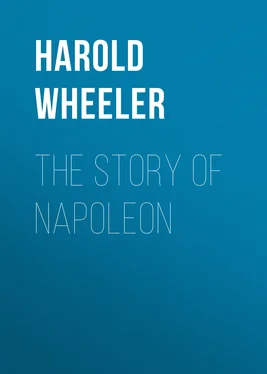Harold Wheeler - The Story of Napoleon
Здесь есть возможность читать онлайн «Harold Wheeler - The Story of Napoleon» — ознакомительный отрывок электронной книги совершенно бесплатно, а после прочтения отрывка купить полную версию. В некоторых случаях можно слушать аудио, скачать через торрент в формате fb2 и присутствует краткое содержание. Жанр: foreign_prose, История, foreign_edu, foreign_antique, на английском языке. Описание произведения, (предисловие) а так же отзывы посетителей доступны на портале библиотеки ЛибКат.
- Название:The Story of Napoleon
- Автор:
- Жанр:
- Год:неизвестен
- ISBN:нет данных
- Рейтинг книги:4 / 5. Голосов: 1
-
Избранное:Добавить в избранное
- Отзывы:
-
Ваша оценка:
- 80
- 1
- 2
- 3
- 4
- 5
The Story of Napoleon: краткое содержание, описание и аннотация
Предлагаем к чтению аннотацию, описание, краткое содержание или предисловие (зависит от того, что написал сам автор книги «The Story of Napoleon»). Если вы не нашли необходимую информацию о книге — напишите в комментариях, мы постараемся отыскать её.
The Story of Napoleon — читать онлайн ознакомительный отрывок
Ниже представлен текст книги, разбитый по страницам. Система сохранения места последней прочитанной страницы, позволяет с удобством читать онлайн бесплатно книгу «The Story of Napoleon», без необходимости каждый раз заново искать на чём Вы остановились. Поставьте закладку, и сможете в любой момент перейти на страницу, на которой закончили чтение.
Интервал:
Закладка:
Years after at St Helena Napoleon related the events of the fatal day as he watched them from a furniture shop belonging to Bourrienne’s brother, Fauvelet. “Before I arrived at the Carrousel,” he says, “I had been met in the Rue des Petits Champs by a group of hideous men carrying a head on the end of a pike. Seeing me well dressed, and looking like a gentleman, they came to me to make me cry, ‘ Vive la Nation! ’ which I did without difficulty, as you may believe. The château was attacked by the violent mob. The King had for his defence at least as many troops as the Convention had on Vendémiaire 13th, when they had to fight against a better-disciplined and more formidable enemy. 1 1 5th October, 1795.—See post , chapter vii. p. 71.
The greater part of the National Guard was on the side of the King—one must do them this justice. When the palace had been fired, and the King had taken refuge in the bosom of the Assembly, I ventured to penetrate into the garden. Never since have any of my battle-fields given me such an idea of death as the mass of the Swiss corpses then presented to me, whether the smallness of the space made the number appear larger, or whether it was because I was to undergo this experience for the first time.... I visited all the cafés in the neighbourhood of the Assembly; everywhere the irritation was extreme, rage was in every heart, it showed itself in all faces, although the people present were not by any means of the lower class, and all these places must have been daily frequented by the same customers, for although I had nothing peculiar in my dress—but perhaps my countenance was more calm—it was easy to see that I excited many looks of hostility and defiance as being unknown and a suspect.”
August 1792 was indeed a month of events fraught with far-reaching consequences. The decree went forth that all religious houses should be confiscated and sold. Along with the death-knell of royalty was sounded that of religion. Élise, the most determined and resolute of Napoleon’s three sisters, was then at the College of St Cyr, and he felt it would not be safe for her to stay in France a single moment longer than was absolutely necessary. He still put family ties before patriotism; in reality each is part and parcel of the other. His position was difficult, for it would have been foolish to have jeopardised his captaincy, but he thought he saw a way out, and applied for a commission which would insure his going to Corsica, which was not granted. A petition to the Directory of the district of Versailles, requesting that he be allowed to accompany Élise, met with a more favourable response. On the 1st September, the day before the revolutionary Commune of Paris began the massacre of hundreds of citizens because they did not happen to sympathise fully with the Revolution, Napoleon conducted his sister from St Cyr. In October they were in their native town once more, Napoleon resuming his duties as second lieutenant-colonel of the volunteers.
The island of Sardinia, which is separated from Corsica by the Strait of Bonifacio and now belongs to Italy, had cherished dreams of declaring her independence. It was therefore determined that Admiral Truguet and a number of troops and volunteers should sail from Marseilles, call at Ajaccio for additional men, and under the command of Raffaelle Casabianca, endeavour to assist the rebellious islanders. Almost as soon as they had landed in Corsica there was trouble between the sailors and the unruly volunteers, three of the latter being hanged in consequence. Paoli, now President of the Administration and Commander-in-Chief of the National Guards, felt that this was indeed a sorry prelude to an expedition in which loyal co-operation was an absolute essential. The aged patriot therefore wisely decided that only regular troops should be sent. Cagliari, the capital of the island, was deemed the most important point of attack; San Stefano was to be occupied by a second division under the command of Colonel Cesari-Colonna, Paoli’s nephew, and accompanied by Napoleon. The attempt on the first place failed miserably owing to a want of confidence on the part of the besiegers, and the troops at San Stefano accomplished little. They certainly effected a landing, and on the night of the 23rd February, 1793, Napoleon and his men hastily erected a battery, from which point of vantage they proceeded to bombard Maddalena. On the following evening, however, the troops showed that they had no more heart for warfare than their compatriots at Cagliari, and a retreat became absolutely necessary. For this Napoleon is in no way to be blamed. There is more than a suspicion of treachery, and it has been suggested that either Paoli or some of his followers had arranged that the expedition should fail in order to humble the too enterprising and over-confident Bonaparte, who was nearly left behind in a disgraceful struggle to get into the boats.
Napoleon’s dream of a free Corsica had long since passed away; he was convinced that without France she might fall a prey to any Power or bold maritime adventurer who cared to risk the attempt upon her. Relations between him and Paoli became more and more strained. Probably he felt in his own mind that the dictator’s cause was hopeless, and consequently offered no advantages. France on the other hand, appeared likely to become all-powerful. She seemingly stopped at nothing, and was as bent on “setting Europe to rights” in her fashion as was Pitt in his. But what was of more immediate importance was the startling and unexpected intelligence that the Convention had ordered Paoli’s arrest, as well as that of Pozzo, his right-hand man. The author of this ill-service was none other than Lucien Bonaparte, who had acted as Paoli’s secretary for several months and was now in France occupying his leisure moments in securing the downfall of the patriot by denouncing him to the authorities at Toulon. This conduct can only be described as infamous, and goes to prove that a keen sense of morality was not a conspicuous trait of the Bonaparte family. Lucien had not taken his brother into his confidence, and no one was more astonished than Napoleon when the truth of the matter was revealed to him. The net result was to embroil more deeply the island in a civil war which had been carried on in a desultory kind of way for some time, breaking out into flame here and there, and dying down almost as speedily.
We now catch a glimpse of Napoleon as a diplomatist. He sent a communication to the Convention glowing with fulsome flattery and pleading that “the patriarch of liberty, and the precursor of the French Republic,” might be spared this last ignominy. The young officer was playing a double part. With Salicetti he planned to secure the citadel of Ajaccio by artifice, but without success. He then decided to tramp to Bastia, where the French Commissioners were investigating the condition of affairs and making preparations for resistance against the islanders. Here he hoped to meet Joseph, who had also attached himself to the French cause. One cannot but admire the dogged determination which prompted such a proceeding. His precept that “It is only by perseverance and tenaciousness that any object can be obtained,” was not a mere moral maxim, a passing thought to be dismissed as casually as it had entered the brain.
Napoleon’s journey across the island was quite an adventurous one. Accompanied only by a poor but sagacious shepherd he traversed rugged ravines and valleys, every recess of which was dangerous and might shelter a band of Paolists. In passing through the village of Bocognano he fell into the hands of the enemy and was locked up in what was considered a safe place. But under cover of night, and by the aid of friends, he effected his escape through a window, and the whole of the following day he was forced to conceal himself in a garden. From this unhappy and insecure hiding-place he made his way to the house of a cousin, but on the evening of his third day there a Nationalist brigadier entered and demanded to search the place. Good fortune again attended the fugitive. The unwelcome visitor was cajoled into a belief that Napoleon, against whom an order for arrest had now been issued, had neither been seen nor heard of in that quarter, and he did not persist in his demand. Shortly after he had left the house he was followed by the refugee, who had been sitting in another room with the servants, all of whom were sufficiently well armed to offer a desperate resistance if necessary.
Читать дальшеИнтервал:
Закладка:
Похожие книги на «The Story of Napoleon»
Представляем Вашему вниманию похожие книги на «The Story of Napoleon» списком для выбора. Мы отобрали схожую по названию и смыслу литературу в надежде предоставить читателям больше вариантов отыскать новые, интересные, ещё непрочитанные произведения.
Обсуждение, отзывы о книге «The Story of Napoleon» и просто собственные мнения читателей. Оставьте ваши комментарии, напишите, что Вы думаете о произведении, его смысле или главных героях. Укажите что конкретно понравилось, а что нет, и почему Вы так считаете.












